Job Half Done
I haven't completed the north-to-south traverse of Africa yet, but I have done the east-to-west.
(Or should that be, an east-to-west. Hardly the widest part).
Windhoek was a bit time-consuming. It seemed to take forever to come out of the western side of the city and eventually reach the bypass, and the decision that had to be made.
There was also the Kalahari.
A couple of weeks ago I thought, from my map, that I'd just be crossing the north-western corner of it in Botswana. But now, reaching Windhoek, I find it stretches westwards past this city all the way to the Atlantic, the Namib desert and the Skeleton Coast.
Which also solves another puzzle. Although it's generally referred to as a desert, all the way to Gobabis and beyond it was fairly full of vegetation. A bit parched maybe but a fair amount of vegetation nevertheless.
Now, on reaching that Western Bypass at last, the right hand indicator suddenly started winking. So right it was, to the north, where the real desert started. And it's a funny thing, but the road became more interesting. That desert mystery returned, the weird colours and shades, the strange light, and the flowing dunes.
And it became quite hot.
The weather had already warmed up quite a bit between entering the country and reaching Windhoek. Now it was pretty hot. And for a while, heading north, we climbed from 5,500 feet to close to 6,000. But I knew that soon the road would swing round to the left and head westwards to the Atlantic and down to sea level. So how hot will it be down there?
I stopped overnight in the pleasant little town of Karibib, at about 5,000 ft and still hot, making me wonder again what the temperature would be on the coast.
After Karibib a steady descent started, with more distant mountains appearing, the grass disappearing, and many different colours in the sandy scenery.
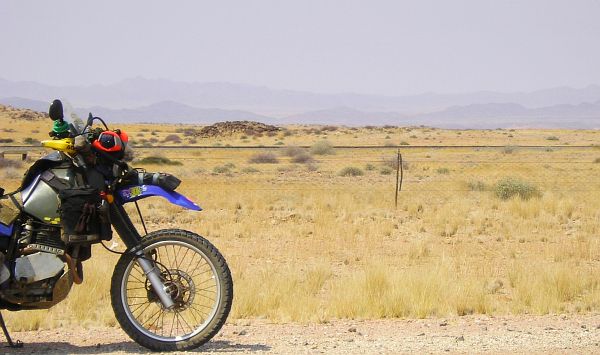
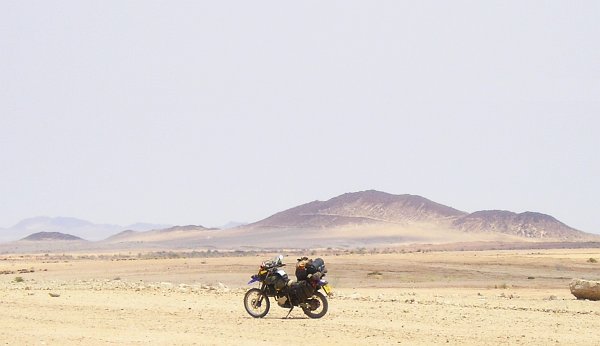
And strangely, the temperature dropped. A steady cooling until it became, errrr, quite cold.
Then a roadsign: - "Fog"
Fog in the desert, how does that happen?
Well, there was no fog on this day, but the far horizon slowly disappeared in a distant mist. And out of it, eventually, came the seaside town of Swakopmund, where the Atlantic Ocean meets the Namib Desert, the Skeleton Coast and the Kalahari.
It was quite an event really, departing Mombasa on the Indian Ocean about five months ago and arriving today at the Atlantic, all on little TTR250, via Kenya, Uganda, Rwanda, Tanzania, Malawi, Mozambique, Zimbabwe, Botswana and Namibia. Job half done!
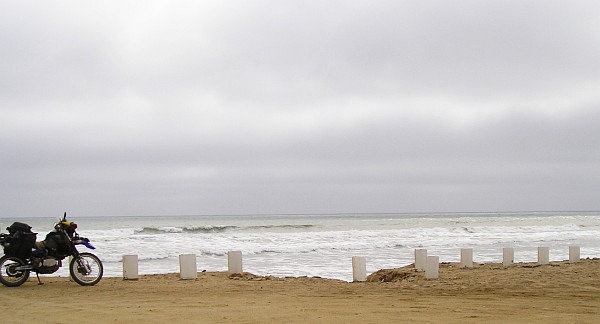
H.M. The Bike and an audience with the Atlantic Ocean.
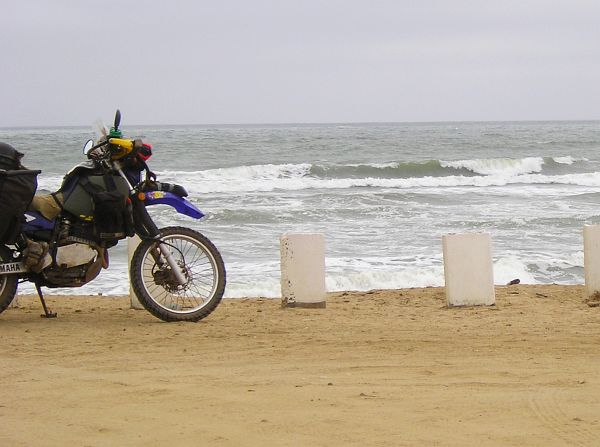
And with an Atlantic breaker.
You can probably guess from these photos that the weather was, well, a touch English. Just like a dull day in Brighton in fact. Cold and damp.
Or the west coast of Ireland - it's the same ocean.
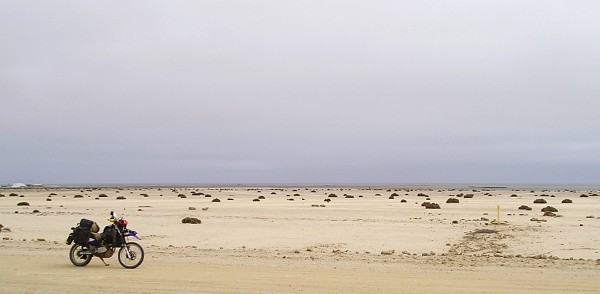
North from Swakopmund - the Skeleton Coast. Atlantic Ocean is on the horizon, swimming in the mist.
Earlier, along various featureless bits of road between Gobabis and Windhoek, I'd computed that if things continue as successfully as hitherto, and I don't veer off into any significant detours between here and the south, I'll still be able to reach Cape Agulhas, see the sights of the Western Cape, and wrap things up at the Cape Town airport cargo area before the expiry of my Carnet.
We'll see.
I also computed that it would be better to arrive home feeling, "Well, that was a nice little trip, I'll plan another one in the New Year somewhere else in the world!" than, "Phew, that went on too long - that's me done with motorbike rides for a few years!"
We'll see.
The next day was sunny and more of the coast beckoned.
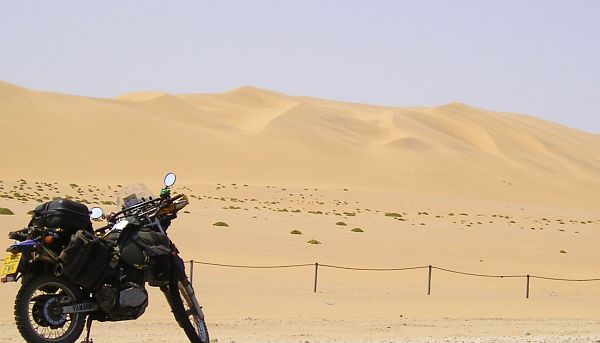
Namib Desert sand dunes.
Off-road 4X4s and quad bikes are big business here, so a lot of the dunes are roped off to prevent them being destroyed by tyres. Not much chance of my tyres getting up one of these.
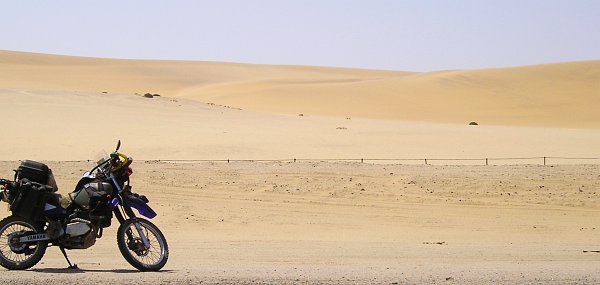
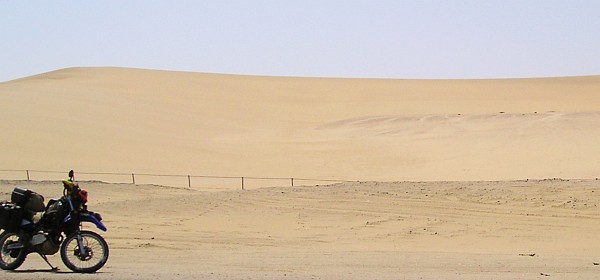
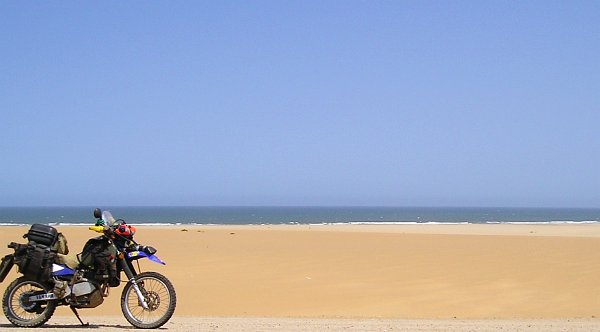
The Atlantic on a sunny day.
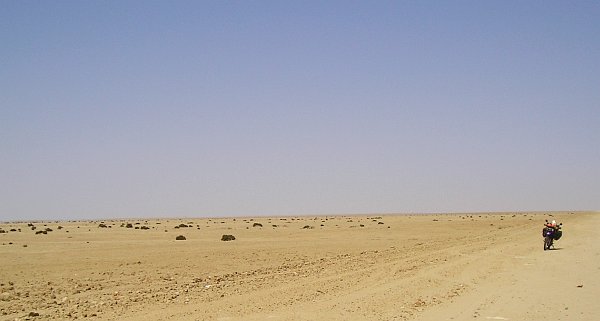
Gingerly leaving the tarmac further into the Skeleton Coast.
Followed by this......
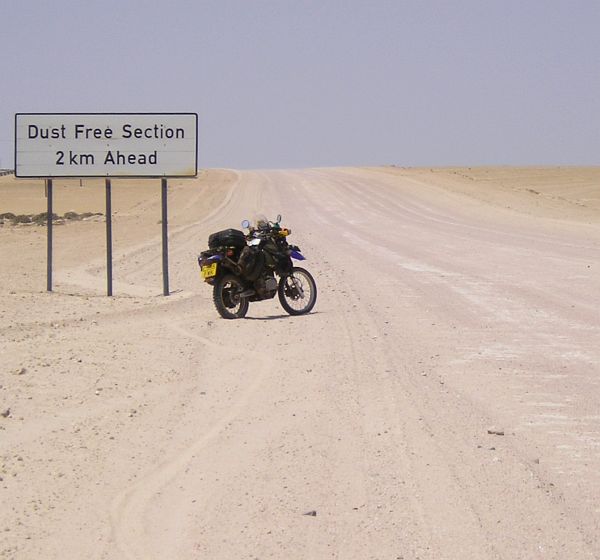
Am I glad to see that!
Beware heavy vacuum cleaners crossing ahead. - Or are we supposed to pay for the dust here??
It turned out to be a 100-yard section of tarmac, in the middle of nowhere. One of the mysteries of the desert.
But this part of Africa isn't really like Africa. Riding around this modern seaside town, complete with Wimpy bar and 50-metre indoor swimming pool - "..... will be closed permanently from 30th June 2010," - roads full of 4X4s carrying racks of sea fishing rods or towing quad bikes, or both, it was more like being in Australia than where I was supposed to be.
Changes are quite subtle.
On greeting someone, in a shop, cafe, someone coming to look at the bike, it's no longer a serious race to be the first to say, "How are you?"
And the response isn't always all smiles and white teeth.
I can't imagine an incident ever happening here that occurred, I think, in western Tanzania:
"Hello, how are you?"
"Fine, thanks. How are you?"
"Very well, thanks. My name is Simon. Nice to meet you."
Now, my name often gives speakers of other languages quite a problem. Strange!
It can be Kin, or Kan, or Kent, or all sorts of permutations. One chap in Kenya was having particular difficulty in working out the pronunciation.
I told him it was no good listening to me, and wrote down the name of his country with the last two letters crossed off. Then we had the big "Ahhhh! Ken!" with Swahili accent and lots of white teeth.
Back to Simon, he got my name wrong a couple of times. "I know," he said. "Cain!"
"Noooo," I said. "It's Ken. Not Cain. That's from Cain and Abel."
At that his eyes lit up enough to illuminate the whole room.
"You know the Bible?" He almost threw his arms around me (that happens in Tanzania) but settled for another long and vigorous three-way handshake instead.
"That's wonderful. I'm so glad you know. I'll see you again."
We met a couple of times after that, I think he either worked in the hotel I was in or was another guest, and he always treated me like a big celebrity.
Religion is no longer a big thing here binding people together. There's a distinct space between black and white people. No sense of everyone looking out for everyone else, and certainly less sense of local people looking out for, or looking after, visitors.
Another change, all-pervading and yet almost unnoticed, the red earth has gone. The dust no longer the colour of post office vans. All is neutral grey, almost white.
And finally, I noticed a place on an internet map that maybe encapsulates the difference between this part of Africa and the eastern side.
It's a luxury lodge out in the dunes not far from where I'm staying now. In its blurb it says "The atmosphere is the real 'Spirit of Africa'........ What makes it one of the last frontiers is the lack of water........... Accommodation offered is ............. chalets all with luxury .......... en-suite bathrooms including an indoor and an outdoor shower....."
I know Africa is perhaps one big dichotomy, but that's a dichotomy too far!
So, time to move on south and maybe complete the job before the customs papers expire.
